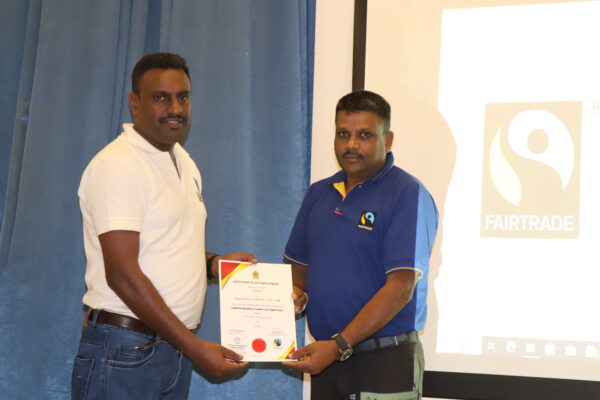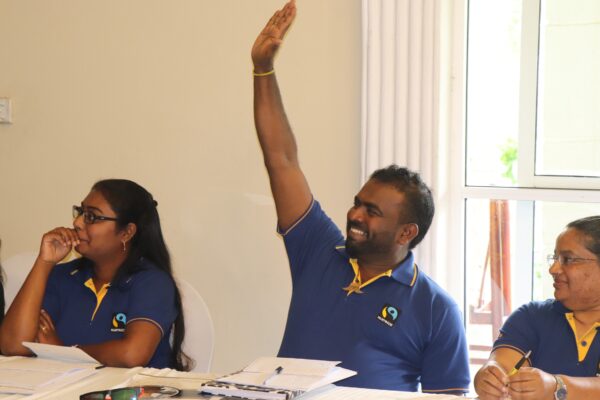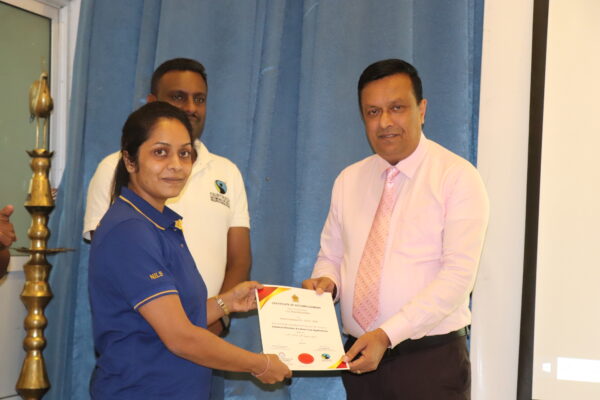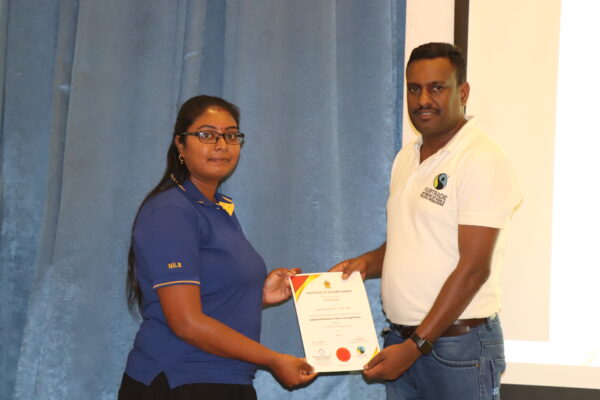In the plantation sector across the Hired Labour Organizations in Sri Lanka, multiple gaps have been identified during the risk mapping sessions held in November 2022 and June 2023. These gaps pertain to a lack of understanding of applicable labour laws and related knowledge. Additionally, deficiencies were found in the grievance mechanism, as well as in the formulation of policies and procedures. Companies within the sector are facing challenges when it comes to aligning their value statements and policies with both national laws and international requirements.
Consequently, Fairtrade NAPP organized a Train the Trainer (ToT) program focused on specific topics related to industrial relations and labour laws. This initiative is being carried out in collaboration with a governmental institution, namely, The National Institute of Labour Studies (NILS). NAPP has developed specialized course content tailored exclusively for the plantation sector. The delivery of the three-day program has been facilitated by an external resource panel, with support from the NILS Management where 29 representatives participated in the training.

The Day 1 of the program a warm welcome speech for setting the tone for the day’s activities. The day was packed with valuable insights especially, with an Occupational Health and Safety (OH&S) session led by the Additional Commissioner of Labour – Industrial Safety from the Department of Labour, Sri Lanka. This session covered crucial topics such as an introduction to Health and Safety at the Workplace, the Factories Ordinance, techniques for conducting risk assessments, strategies for risk remediation, and the importance of monitoring and evaluating safety measures. A group activity engaged participants in practical learning, and the day was rounded off with a session connecting these concepts to Fairtrade Standards by a Program Consultant to reinforce the alignment of safety practices with ethical standards.
 On Day 2 of the program, participants delved into Industrial Relations and Industrial Peace with a comprehensive agenda. The day commenced with an introduction to these vital concepts, highlighting the pivotal role played by various actors within the context of industrial relations. Understanding the significance of industrial relations and the myriad factors that influence them was emphasized. Furthermore, a historical perspective on social security systems, both globally and in Sri Lanka, was provided. Participants gained insights into the intricacies of social security systems specific to private sector employment in Sri Lanka, appreciating their importance and necessity. The day also covered crucial national legislation related to social security, including the EPF Act, ETF Act, Gratuity Act, Termination Act (pertaining to termination benefits), and relevant sections of the Budgetary Relief Allowance Act, Minimum Wage Act, Maternity Benefits Ordinance, and Workmen Compensation Ordinance by the Legal expert W.A. Lalith Kumara, Attorney at Law. The day concluded with a session connecting these learnings to Fairtrade Standards, facilitated by a Program Consultant to reinforce the alignment of labour practices with ethical standards.
On Day 2 of the program, participants delved into Industrial Relations and Industrial Peace with a comprehensive agenda. The day commenced with an introduction to these vital concepts, highlighting the pivotal role played by various actors within the context of industrial relations. Understanding the significance of industrial relations and the myriad factors that influence them was emphasized. Furthermore, a historical perspective on social security systems, both globally and in Sri Lanka, was provided. Participants gained insights into the intricacies of social security systems specific to private sector employment in Sri Lanka, appreciating their importance and necessity. The day also covered crucial national legislation related to social security, including the EPF Act, ETF Act, Gratuity Act, Termination Act (pertaining to termination benefits), and relevant sections of the Budgetary Relief Allowance Act, Minimum Wage Act, Maternity Benefits Ordinance, and Workmen Compensation Ordinance by the Legal expert W.A. Lalith Kumara, Attorney at Law. The day concluded with a session connecting these learnings to Fairtrade Standards, facilitated by a Program Consultant to reinforce the alignment of labour practices with ethical standards.

On Day 3 of the program, participants delved into an extensive range of topics relevant to labour and employment regulations. The agenda included discussions on the Shop and Office Act, Wages Board Ordinance, and the Minimum Wage Act, all of which are critical components of labor law. The Industrial Dispute Act was explored in depth that focused on collective agreements. Participants gained insights into various terms and conditions governing employment, including working hours, leave policies, overtime regulations, holiday entitlements, minimum wage considerations, and night work regulations. Understanding the importance of employment contracts and letters of appointment was highlighted, as was the Employment of Women, Young Persons, and Children Act. A Senior Legal Officer from Department of Labour, Sri Lanka facilitated the discussion that covered aspects of Trade Union Law and delved into the complexities of industrial disputes, including the definition of grievances, grievance mechanisms, and procedures in addition to the formation of Gender/Women Committees. The day concluded with a session connecting these legal insights to Fairtrade Standards, facilitated by a Program Consultant, and participants were awarded certificates to acknowledge their participation and learning achievements.

This training program offered valuable opportunities for participants to establish connections with key industrial stakeholders such as labour officers and attorneys at law, enabling them to seek clarification on various issues pertaining to labour laws and regulations. It was evident that participants expressed a strong willingness to pursue further subcourses related to this area that underscores their commitment to enhancing their knowledge in this field. However, it is essential to acknowledge the challenges faced during the program. The vast scope of labour law necessitates more time for comprehensive coverage of all relevant topics, and the time constraints were evident. Additionally, it was noted that some participants from specific departments may not find certain aspects of the subject directly relevant to their roles, highlighting the importance of tailoring future training programs to individual departmental needs. Despite these challenges, the program successfully fostered knowledge and networking opportunities for participants in the complex landscape of labour law and industrial relations.
Testimonials:
“I extend my gratitude for arranging this program. I extend my gratitude for your unwavering dedication. Your timely intervention has proven invaluable through this program. Your ability to identify our needs at the opportune moment is commendable. The TOT training on Labour Laws and Industrial Disputes holds immense significance for us, and sponsorship of the Fairtrade Network of Asia and the Pacific is greatly appreciated. The insights shared by the National Institute of Labor Studies have enriched us with valuable knowledge. Best regard. It presents a valuable opportunity for our group, and the topic aligns with the need to enhance our knowledge over time. We eagerly anticipate our group’s participation on this occasion.” – Darshana Deshapriya Ananda, Madulsima Plantations PLC, Sri Lanka
“I express my gratitude for your intervention in identifying our gaps in the very topic. This TOT training is very important for us to maintain fair industrial disputes in our estates and maintain labour laws properly. For that, the support of the Fairtrade Network in the Asia Pacific region is greatly appreciated, and I am grateful to the National Institute of Labor Studies for sharing valuable knowledge. Also, I would like to express my (Hatton Plantations plc) gratitude to you for your continued support for such programs.” – Torans Jayasanka, Hatton Plantations PLC, Sri Lanka.











